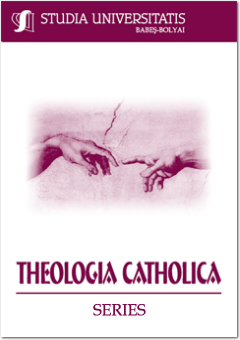ΚΑΤΑ ΑΦΑΙΡΕΣΙΝ: TEOLOGIA NEGAŢIEI ABSTRACTIVE LA ALBINUS
ΚΑΤΑ ΑΦΑΙΡΕΣΙΝ: ALBINUS’S THEOLOGY OF ABSTRACT NEGATION
Author(s): Daniel JugrinSubject(s): Christian Theology and Religion
Published by: Studia Universitatis Babes-Bolyai
Keywords: Middle Platonism; Albinus (Alcinoos); via negativa; via analogiae; via eminentiae; aphairesis; transcendent God;
Summary/Abstract: Κατὰ ἀφαίρεσιν: Albinus’s Theology of Abstract Negation. Albinus (Alcinous) devoted a whole chapter of his manual to the problem of the “First God”, drawing his inspiration from the Platonic writings; therefore, the thinker perceives it as a principle which transcends the world, but also as an Intellect. Moreover, Albinus’s transcendent God could be considered as an Aristotelic nous akinetos, possessing the qualities of the Platonic Forms, namely the Good and the Beauty. In Didaskalikos, Albinus presents systematically the three ways which lead to the knowledge of God: via remotionis, via analogiae and via eminentiae. The first method, via remotionis consists in an ontological subtraction from God of what has been previously invalidated through negation. God is arrhetos because he is beyond categorical determinations, but there is nonetheless an apprehension of Him by stripping off (aphairesis) any ontological property which belongs to the realm of being. Aphairesis is a notion associated with Aristotelic and Euclidian geometry, being elucidated through the example of the isolation of the mathematical point. The other two ways of knowing encompass the analogy, which is represented in reference to the simile of the sun in the Republic, and anagogy, the upward movement of the mind towards the intelligible, whose paradigm seems to be Diotima’s speech in the Symposium.
Journal: Studia Universitatis Babes Bolyai - Theologia Catholica
- Issue Year: 57/2012
- Issue No: 3-4
- Page Range: 25-40
- Page Count: 16
- Language: Romanian

